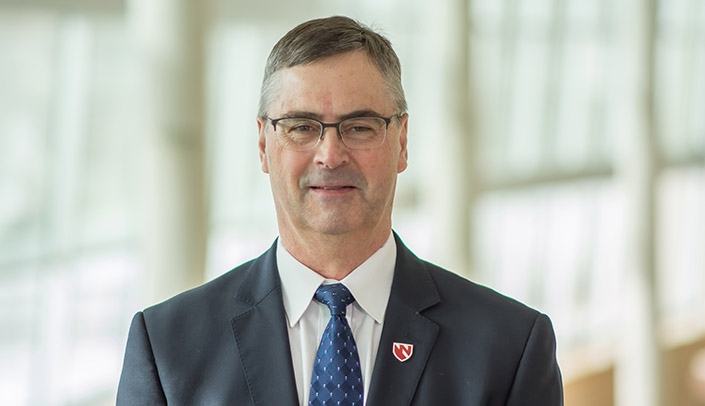The National Center for Advancing Translational Sciences-funded National COVID Cohort Collaborative (N3C) is open for business and recruiting interested investigators across the clinical and translational spectrum to engage with this health record repository containing the largest, most representative U.S. cohort of COVID-19 cases and controls to date.
“The coronavirus pandemic spurred the research community to build, for the first time, a national process for collecting and harmonizing electronic health records from many institutions into a collective resource,” said James McClay, MD, principal investigator for UNMC’s Clinical Research Analytics Environment (CRANE), which is the de-identified data warehouse that supplies data to N3C.
“The N3C platform provides the data and analytics power to allow researchers and clinicians to quickly examine and answer hypothesis about the COVID-19,” Dr. McClay said. “This shared resource will accelerate scientific understanding of the impact of the pandemic across the population.”
The N3C Data Enclave is a secure platform through which the clinical data provided by contributing members is stored in a harmonized format. The data itself can only be accessed through a secure cloud portal hosted by NCATS and cannot be downloaded or removed. Collaborative efforts are organized across “Domain Teams,” which focus on clinical subject areas or cross-cutting issues to facilitate sharing of ideas, resources and knowledge to support team science.
UNMC nephrologist Roslyn Mannon, MD is working in the Immunosuppressed/Compromised Clinical Domain Team to gain a better understanding of how COVID-19 affects patient populations with suppressed or compromised immune systems. One subdomain, the Solid Organ Transplant working group, has three presentations at upcoming national transplant meetings and is developing several manuscripts using a team approach, including work by UNMC biostatistician Ran Dai, PhD.
“Participating in N3C has been an incredible opportunity to collaborate with new colleagues and gain experience in a national data resource in solid organ transplantation and COVID-19 that is more granular than published registry data,” Dr. Mannon said. “I’m grateful to be leading a part of this effort, and to work with remarkable individuals who are adding these projects to their already busy workloads.”
UNMC also is leading a Rural Health Clinical Domain Team, through N3C that seeks to understand the epidemiology, utilization, treatment and outcomes of the COVID-19 pandemic in rural communities.
“The overarching goal is to develop better evidence for potential differences in the COVID-19 epidemic response and outcomes for rural health care centers and rural dwellers,” Dr. McClay said. “Studying the at-risk populations and unique challenges faced by rural communities during and after the pandemic may provide opportunities for improving rural health and health care.”
Researchers interested in learning more about N3C, submitting a project or joining a Domain Team please contact Dr. McClay or Jerrod Anzalone.
